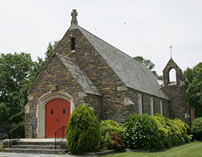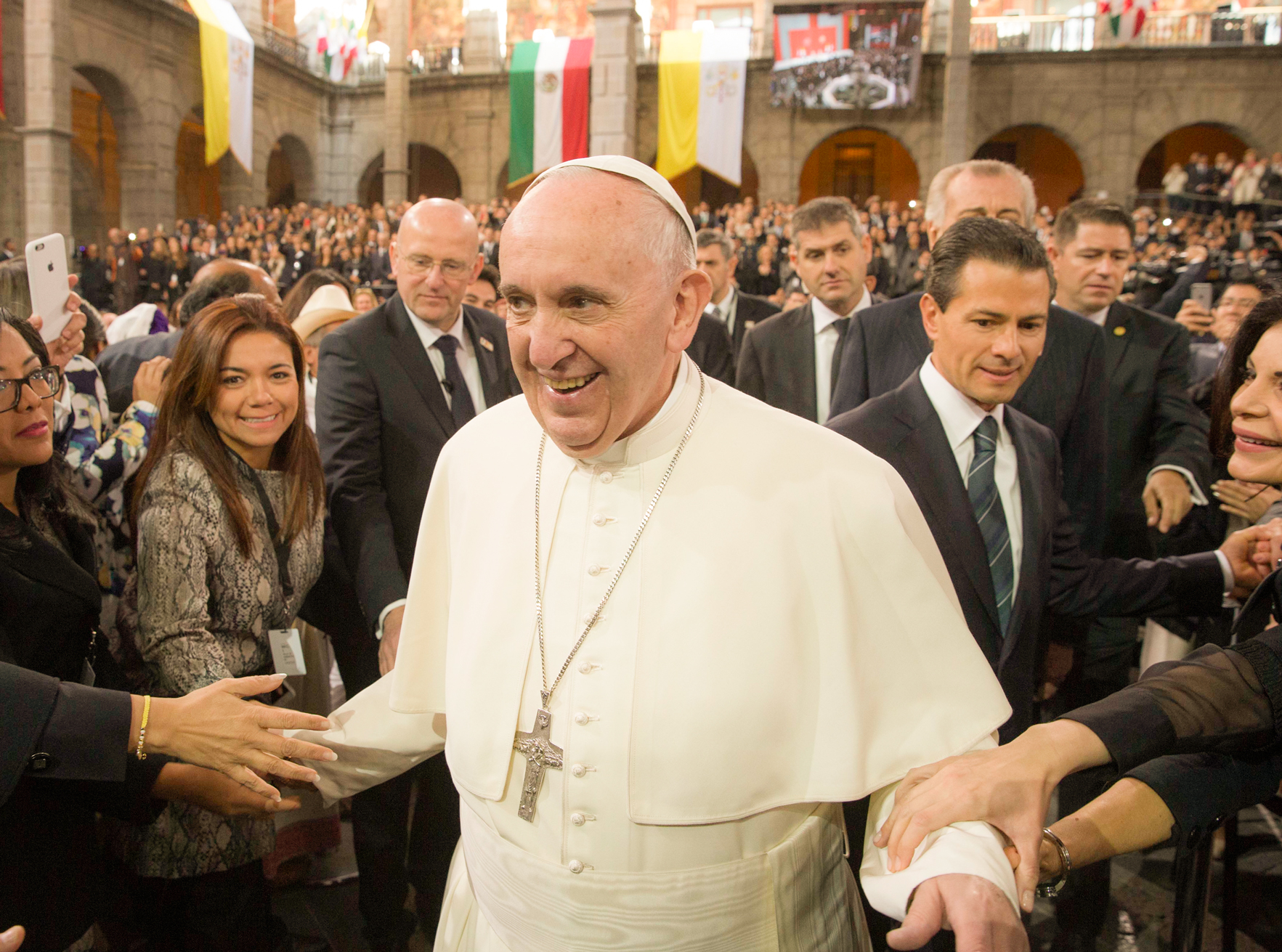I have often gone to the Mass of the Lord’s Supper at a parish where everyone washes everyone else’s feet… during the Gospel. The people remove their shoes and socks when they stand for the Gospel, the priest reads up to the point where Jesus says, “Do you know what I have done for you?” and thereupon starts singing the mandate. He then goes to wash, and the whole Church then begins to move, coming forward to wash and be washed in turn. Ten minutes, with a musical setting of the mandate being sung and played throughout. Then, when this is complete the priest returns to the Gospel, and concludes, “The Gospel of the Lord.” It is, without doubt, the most powerful liturgical action I have ever seen.
Maybe until Pope Francis. Pope Francis, in his Holy Thursday Mass, washed the feet of women, prisoners, non-Christians. Rita Ferrone, over at dot Commonweal, links to the reaction in some quarters, which is so virulent that some express a hope that Benedict will rescind his resignation and Francis will become an “anti-pope.” Another says he is “almost tyrannical and very determined in his demolition of papal authority.”
The fact that some find the actions of Pope Francis and the parish described above as incredibly moving and extraordinary manifestations of the Faith, while others find them ugly and verging on sacrilege, is perhaps worth considering on Good Friday, the day we yell out “Crucify him!” and remember how spurned and rejected God was and is. The priest at my parents’ parish preached a very nice Palm Sunday homily, where he drew attention to the “two gospels” of the day, and reminded us that Jesus enters the city to palms and shouts of acclamation, but exits to insults, scorn, and bearing a cross. The Christian path, he said, must encounter both realities if we are truly following Jesus.
It’s obvious – really painfully obvious as these passions play out – that people in all roles in the Passion narratives misunderstand what is going on. The misunderstandings seem to hover in an uncomfortable place between confusion (“Lord, shall we use the sword?”) and willful contempt (“We have no king but Caesar.”). That Jesus is rejected, scorned, abandoned, and betrayed is what is made clear.
Within the Church today, we seem to be trapped in a situation where we are also filled with misunderstandings about Jesus, with the result that we too often end up rejected and even crucifying one another – and so do so to Him as well. I think a comment from a young priest on Pope Francis’ action sheds light on this. He writes that
I am a young, recently ordained priest. Tonight, I planned on preaching about the Eucharist and the institution of the priesthood. How can I speak about such things – the self-offering of Christ, the 12 viri selecti – when our Holy Father is witnessing to something different? I feel like going up to the congregation and saying, “I don’t have any idea what the symbolism of the washing of the feet is. Why don’t we just all do what we want.”
What I find striking about this comment is how it leaps from the fact that Francis did not perform the rite as a tribute to the priesthood to the claim that “anything goes.” This is quite unjustified. Does this young priest, whom we should respect because he has in fact given his life in service to the Church, really have no idea what Francis is doing here? The pope did not do something crazy, like ordaining non-Christians – he simply enacted the footwashing in a way that brought out particularly the physical humility and vulnerability of the action. Another commenter wrote:
To me, it seems like there are two separate messages in the washing of the feet: (1) God condescending to man in an incredible act of humility; (2) God teaching his apostles how they were to lead (as a prelude to instituting the priesthood). The Pope is teaching the world about the former, perhaps at the expense of the latter. But his message is being received well.
That is refreshingly nuanced. It seems to me that Francis did not perform this action in order to diminish the ministerial priesthood, but neither did he do it in some way that reduces Jesus’ mission to mere “social service.” What he did – what the parish above does – is make the actions of Jesus living. But it is worthwhile to pause and recognize that there is also truth in the idea that Jesus is specifically offering a “mandate” for leadership as well. After all, the pope’s actions are powerful in part because he is the pope. What seems harder for me to understand is how one then takes this “mandate” for leadership to be an occasion for forms of pomp, elaborate dress, and the like – in short, for attributing a kind of “honor” to the priesthood that looks more like worldly honor.
So I would like to believe that these kinds of actions, rightly understood, can push us past the misunderstandings – in caricatured terms, to be sure, views of Jesus and His mission that are “too high” or “too low.” For too long in the Catholic Church, we have been stuck in a place where Jesus’ mission has been used as the occasion for exaggerated misunderstandings, from the shocked reactions of traditionalists to the painful broadside of Gary Wills against the ministerial priesthood altogether. I am increasingly hopeful that Francis is a unique man, whose words and gestures are meant to draw us beyond these misunderstandings. I am sure there will be moments when Francis is faced with the cross, instead of the celebratory “palms” that greet his Holy Thursday actions. But let us pray that his actions can help us all stop reenacting the confusions and misunderstandings whereby we Catholics pierce the Body of Christ. From this pierced Body, then, by the Holy Spirit, we can arise for a new day.





David,
Thanks for this. When taken within the context of his homily for the chrism mass, and the cautions against being self-referential….I think that Francis’ “style” and outward signs are revealing something quite substantial about his understanding of the ministry of the priesthood (as well as the pope) but which extends to all believers….It is a pastoral one but one that I hope will refocus our sights on those on the margins. Two elements of the Holy Thursday story, as it is being covered, stick out for me —
first, the quote from a boy in the detention center – reported in L’osservatore romano that “a Caritas worker in the penal institute said that on hearing news of the pope’s visit, one of the youngsters exclaimed: “At last I’ll get to meet someone who says he is my father!” and
second – the texts of the letters written by young men in jail in LA to the Pope. These young men were visited by the Jesuit novitiate according to the story – but the text of these letters….the hope provided by the deep belief that the Holy Father has not forgotten them (when they pretty much believe everyone else has forgotten and given up on them)
It is the Good News come to life – it is witnessing to what Luke Ch4 states in perhaps the most profound way I’ve ever seen….Making Jesus’ gospel living as you state above.
“I don’t have any idea what the symbolism of the washing of the feet is”
A call for better understanding of the cultural context of scripture.
FSJ explained the meaning in his homily: service + forgiveness.
God Bless
Lovely post. Thank you!
David,
Thanks for this reflection. I was very happy with Pope Francis’ choice. It seems to me that the gospel story at the heart of the Holy Thursday liturgy is primarily about what all followers of Christ should do. It has always been my favorite because it suggests that serving others is at the core of what it means to follow Christ. Services that takes the institution of the priesthood to be central seem to miss that essential point.
At the service I attended, the priest washed the feet of new parishioners (a mix of young and old, men and women, boys and girls) and then the First Communion class helped clear the altar and processed around church, “chasing after Jesus,” as the priest put it. During the closing song, the choir stood in places all around the church leading us all in song as we pondered what it would have been like to be there that night. This was a ritual about the whole church and it so alive. In the midst of so much emphasis on clergy and hierarchy, it reminded me of what I love about being Catholic.
Does the Roman Missal call for men’s (viri selecti) feet to be washed? Yes. Why deviate from the red (rubrics) and cause more confusion? Almost seems like a false humility.
Wash women’s and muslims feet outside the Triduum.
Far more people were drawn to the Church (we should count them in the 10s of millions) by this act than were “confused.” I’ve had friends personally e-mail me to tell me that it has made them consider becoming Catholic.
Both the Vatican and the United States Conference of Catholic Bishops have made it clear over the years that this is legitimate to do during the Triduum on the basis of local custom. There should be no controversy about this kind of foot washing unless one is using it as a proxy for fighting another kind of battle.